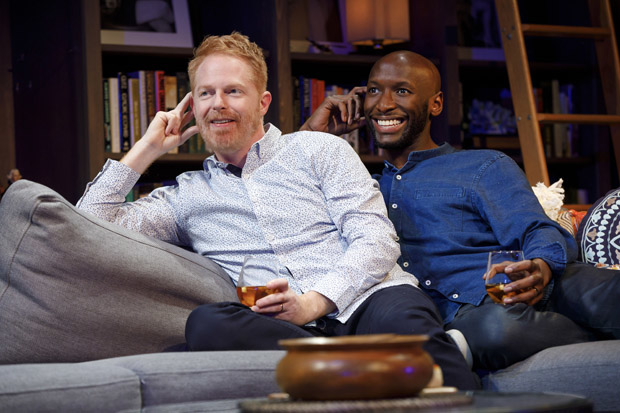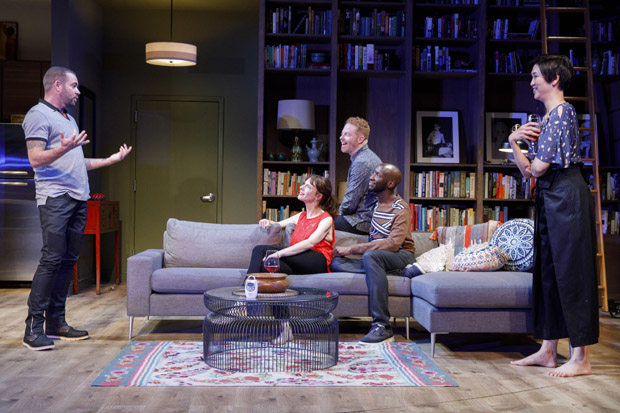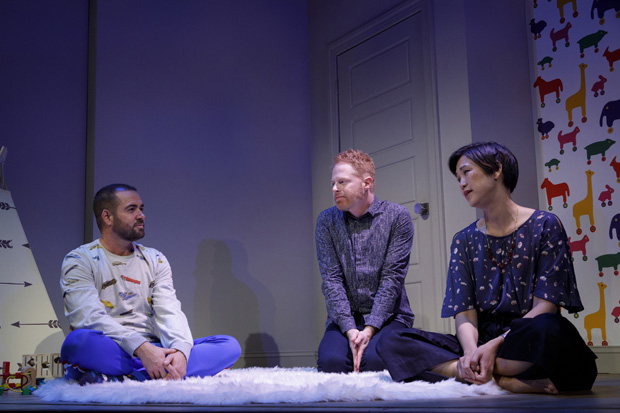A Log Cabin Built From Lies and Laughter
Jesse Tyler Ferguson stars in Jordan Harrison’s provocative new comedy at Playwright Horizons.

(© Joan Marcus)
It has become cliché to marvel at the rapid advance of LGBT rights, especially this time of year. Yet for all our legislative and judicial victories around marriage and military service, what did we really win but the opportunity to join two of humanity's most conservative institutions? Certainly, acceptance of gay and lesbian people has grown, aided partially by sitcoms like Modern Family that depict happy upper-middle class gays living "normal" suburban lives. Even if all that suits you just fine, it is difficult to deny that one of the letters in our alphabet coalition is regularly erased (and that's the T). Did society really change, or did the gays? Now making its world premiere at Playwrights Horizons, Jordan Harrison's exhilarating and insightful Log Cabin examines our impulse to slam the door behind us just as we cross the threshold of privilege.
It mostly takes place in the posh Brooklyn apartment of Pam (Cindy Cheung) and Jules (a slightly intimidating Dolly Wells), a lesbian couple approaching parenthood. Their friends Chris (Phillip James Brannon) and Ezra (Jesse Tyler Ferguson) are a gay couple also living well in New York (Ezra and Jules tauntingly refer to each other as "one percent"). The play opens with Ezra breathlessly recounting the latest slight from his father, who decided to bring up the AIDS epidemic upon learning of his son's engagement to Chris. Everyone is aghast, but could they ever make similarly offensive comments?

(© Joan Marcus)
We find out when Ezra invites his high school best friend, Henry (the effortlessly hilarious Ian Harvie), over for an introduction. Henry was Helen back then, but he is now living as a rather sexy man with a younger girlfriend named Myna (Talene Monahon playing a thin millennial stereotype, as so many real twentysomethings disappointingly turn out to be). Jules asks if Myna is specifically attracted to trans men. Chris (who is black) bristles at the implication that because he comes from money, he has it better off than Henry. Henry and Myna are also challenged to defend the label "cis" (a prefix meant to denote non-trans people that many people take issue with). The discussion goes from genial to heated way before anyone is drunk enough to even say what they really think.
Lest you think this play is just a staging of the tiresome liberal circular firing squad, know that the above scene is just a small fraction of this uproarious 90-minute look at parenting, long-term relationships, and the lie of "normalcy." Log Cabin is a howler that will keep you laughing as you watch through the space between your fingers.
Harrison deepens his characters in surprising ways as the play progresses, a process supported by clear and multilayered performances. As the stoic Pam, Cheung spends much of the play mixing sophisticated cocktails and grunting monosyllabic responses to the banter in the living room. When she finally comes to her big monologue, it's a knockout — and far more effective than the thesis-explaining scene in Harrison's last play. As ever, Ferguson's devastating comic timing is on target. Sure, Ezra is calibrated a few shades darker than his character from Modern Family, but he's so darn good at playing that role, serving "annotated bitchiness" with the dryness of a martini glass full of gin. Conversely, Brannon plays Chris with the measured discretion of someone who knows how to choose his battles with his type-A husband.

(© Joan Marcus)
Director Pam MacKinnon delivers a tight staging, with all of the laugh lines landing and the design elements serving the story. Allen Moyer's rotating set provides for alternate locations while extravagantly realizing the main space. Jessica Pabst's costumes subtly capture the aspiration of the characters (Henry's butch leather jacket suggests a guy who loves to be called "sir"). Sound designer Leah Gelpe keeps us engaged during transitions with up-tempo pop music. Lighting designer Russell H. Champa evokes bourgeois Brooklyn comfort with a mixture of traditional stage lights and table lamps. It all results in a perfect marriage of form and function.
Of course, Log Cabin questions the idea that any marriage could ever be perfect. "I love you, Ezra, but you are a lot," Pam remarks. "And if Chris can do eight years of it and survive, then, well…" Her words are important to ponder as Americans gay, straight, and otherwise consider marriage in our ongoing quest to have it all.










